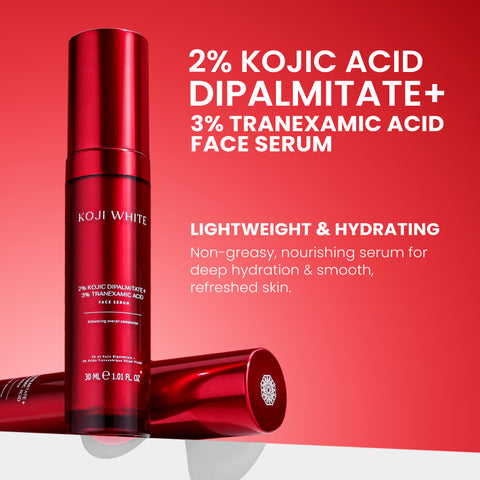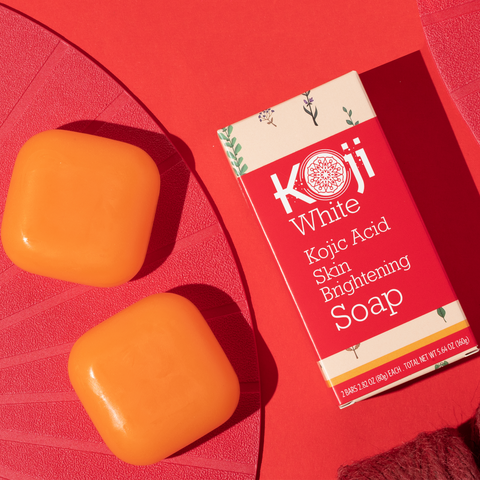Begin searching for lightening skincare and it won’t be long before you stumble across kojic acid. If you’re new to active ingredient skincare even the name kojic acid might make you apprehensive. Can you put an acid on your face safely? Are actives which lighten your skin OK to use? Is kojic acid bad for your skin? Could kojic acid be great for your skin? These are all valid questions. Questions we’re here to answer in depth today.

Is Kojic Acid Bad for Your Skin?
First stop: Is putting an acid on your face ever safe? Here’s what you need to know – the word acid doesn’t necessarily mean the ingredient is highly acidic. Take hyaluronic acid as an example, hyaluronic acid is called an acid because of its structure, however hyaluronic acid in solution has an almost neutral pH level i.e. it’s only a tiny bit acidic.
While kojic acid is more acidic than hyaluronic acid it’s easily formulated to a skin similar pH level.
Fact: Your skin has an acidic pH, usually somewhere between 4.2-5.5.
Because your skin’s naturally slightly acidic, it’s actually best treated with skincare ingredients which are also slightly acidic. Kojic acid ticks this box.
Bottom line: Yes it is safe to use acids on your skin when they’re formulated to the correct pH level.
Is Kojic Acid Safe for Skin Brightening?
We believe in kojic acids safety, however we don’t just want you to take our word for it. In 2010 the independent Cosmetics Ingredient Review Expert Panel concluded kojic acid is a safe to use on skin, reporting that available data supports the use of kojic acid at concentrations of up to 2% in leave on cosmetics. At this concentration there may be no risk of sensitization i.e. allergic reaction.
It’s also worth noting kojic acid is not known to be cytotoxic like other popular skin lightening actives i.e. hydroquinone. Kojic acid works for as long as kojic acid skincare is used. After stopping use your skin may regain its natural pigment levels within a few months. However use hydroquinone and your skin may permanently be whitened (we discuss why this isn’t a good thing soon). Hydroquinone has the potential ability to destroy your melanin making cells and damage your skin’s DNA. Kojic acid is therefore considered much safer than hydroquinone.
Is Kojic Acid Safe? What Kojic Acid Side Effects Should You Be Aware Of?
While kojic acid is safe for use on skin there’s 1 potential side effect anyone using kojic acid skincare should be aware of… and for that matter anyone using lightening skincare should be aware of. Kojic acid is active in lightening your skin because it’s temporarily able to switch of your skin’s melanin production. When less melanin pigment is made your skin becomes lighter.
However melanin has purpose, which means when your skin tone becomes lighter, your skin becomes less able to help protect your skin against sunburn and sun damage. This is why your skin may tan more when in direct sunlight – it’s your body’s natural way of protecting against UV light.
Because actives like hydroquinone may completely destroy your skin’s ability to make melanin, permanent lightening can come accompanied with extreme sensitivity and continuing risk of sunburn.
However you should also remember using any kind of lightening skincare may increase your risk of sunburn. To help protect your skin we recommend to use lightening creams with an SPF included, like in our Kojic Acid & Papaya Skin Lightening Body Lotion









